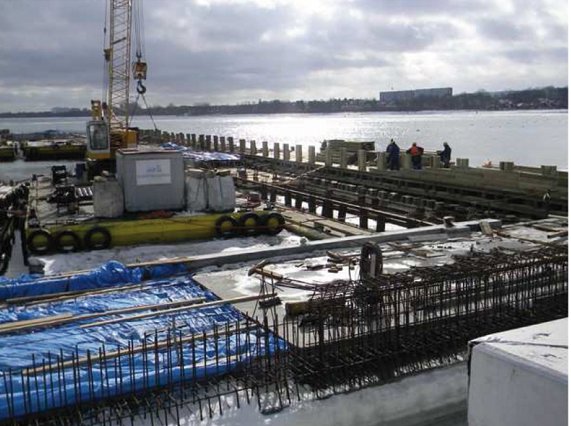Being called “the Pearl of Sopot,” the pier is one of the most popular recreational and entertainment venues in Poland. Each year, thousands of tourists visit this place, mainly due to the high concentration of iodine, which is twice as high as on land. Apart from having health benefits, the pier also serves as a mooring point for cruise boats and yachts.
The history of the Sopot pier dates back to 1827, when it was built by George Haffner. Over the years, the original 31.5 metres long construction underwent significant changes. It was lengthened first to 150 metres, and then to 315 metres. In 1927, the major reconstruction of the pier was undertaken, the result of which is its present shape, consisting of the main deck (511.5 metres), lower decks, and the side deck.Since then, only minor repairs and conservation works have It is worth mentioning that the Sopot pier is built mainly of wood and based on wooden posts, which are constantly exposed to sea water. For example, in the years 1976–1977 and 1990–1991, the forehead and the side deck of the pier were seriously damaged by violent storms. The accidents inclined the local authorities to strengthen the construction by shoring it up with I-beams in the form of steel girders. Consequently, the combination of wooden and steel beams produced a kind of grillage, able to bear heavy load.

Steel girders were also used for building a nearby marina, which can berth more than 100 vessels. In fact, steel and reinforced concrete structure under the water aims to disperse the energy of the waves, thereby making the marina prepared for severe weather conditions.
Without any doubt, both the Sopot pier and marina come up to the expectations of seamen and visitors, providing them with a whole range of facilities and attractions. So, if you haven’t decided where to go on holiday yet, do not hesitate – come to Sopot.
Magdalena Kaczor

GLOSSARY:
pier –molo
well-deserved –zasłużony
hustle and bustle – zgiełk i zamęt
to set off – wyruszać
venue – miejsce
health benefits – właściwości lecznicze
mooring point – miejsce cumowania
to undergo significant changes – przejść znaczne zmiany / przeobrażenia
to lengthen – przedłużyć
to undertake – podejmować się, przedsięwziąć
deck – tu: pomost, pokład
minor – drobny
post – słup, pal
to be exposed to – wystawiony na działanie
forehead – czoło (przednia część) mola
to incline – skłaniać
local authorities – władze lokalne
to strengthen – wzmacniać
to shore up – podpierać
I-beam – dwuteownik
steel girders – stalowe belki
grillage – ruszt (belkowy)
to bear heavy load – wytrzymywać duży ciężar
marina – przystań, marina
to berth – przycumować
vessel – statek
reinforced concrete – żelbetowy
to disperse – rozpraszać
severe weather conditions – trudne warunki pogodowe
to come up to expectations – spełniać oczekiwania
a whole range of – mnóstwo
to hesitate – wahać się




